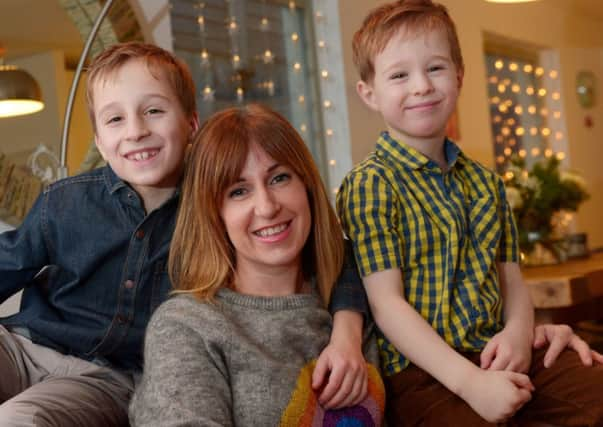Nicola Welsh dedicates life to helping bereaved parents


Doctors had told the couple there was nothing more they could do for 20-day-old Theo, who was born with his intestines outside his body, and the couple made the agonising decision to let him go.
“I didn’t want him to die in an emergency situation with me watching helplessly. So we agreed with the doctors we would tell them when we were ready. I have no idea to this day how I ever made that decision, but we didn’t want him to suffer any more,” she says.
Advertisement
Hide AdAdvertisement
Hide Ad“Gary and I held him together. We told him he could go. I didn’t feel like it was goodbye, it was a handing over. He survived for about 15 minutes.”
It’s almost seven years since that heart-breaking moment on January 30, 2009 at the Sick Kids – and one year since Nicola, 41, left her career in teaching to take over as chief executive of SANDS Lothians, the stillbirth and neonatal death charity.
“To use your experience of pain and loss to bring something positive to others is a real privilege,” she says.
The charity has done much to break taboos around infant death from the days when babies were whipped away from mothers on the grounds that “least said, soonest mended”, leaving families no time to gather memories and to grieve.
Advertisement
Hide AdAdvertisement
Hide AdThese days the charity, which is independent from the UK-wide Sands, offers free counselling, support groups and a befriending service, as well as the chance to drop in to its centre in Craiglockhart to talk.
Nicola is particularly proud of the work the charity does training medical staff to deal with bereaved families – it’s now part of the curriculum on Napier University’s midwifery course. But she says a core part of SANDS’ work will always be the bereaved supporting the bereaved. “Because it’s hard to find someone else who understands just how many pieces you are shattered into,” Nicola says. “There is sadness, anger – you are so angry that it should be you. There is envy of people with babies. And I don’t think people realise just how long it takes.”
Nicola was already a mother when she became pregnant in 2008; her son Lucas is now eight. But her 13-week scan revealed the baby had exomphalos, a one-in-5000 condition, in which the abdominal muscles don’t fully close and the intestines leak into the umbilical cord. The condition can often be rectified with surgery after birth, so while Gary and Nicola were worried, they weren’t despondent.
Theo was born early at 31 weeks at Edinburgh Royal Infirmary, and was taken to the Sick Kids.
Advertisement
Hide AdAdvertisement
Hide Ad“He was stable initially, however his exomphalos was very large and the opening in his tummy was closing – it was his body trying to heal itself, but with the contents of his abdomen still outside,” says Nicola. “I will always take it that was going to happen anyway and, if he hadn’t come early, we would have never met him. But we were still very hopeful and enjoyed spending time with him. We couldn’t hold him though and that was difficult.”
However, after Theo’s last surgery, that changed.
“The doctors said ‘there is nothing more we can do, his intestines are dying’. We had him christened and close family came to say goodbye, including Lucas. We had a big funeral. It’s an act of love which becomes part of your memory-making. If it can be done right, it does give comfort in years to come,” she says, adding that SANDS can help parents plan funerals.
“After that, it was just survival. Your life is completely shattered. Everyone after a loss never goes back to being the same. It’s a new you, and that’s part of grieving, learning to be the new you. Unfortunately I felt it was a struggle to get support.”
It was only when she became pregnant again in 2010 that she felt hopeful once more. “Theo was the first person I told. I feel we are still connected in our journeys, but I just can’t physically see him.
Advertisement
Hide AdAdvertisement
Hide Ad“Oscar arrived just before his due date in 2011. My last baby has been a wonderful healer. There are still lots of sad times and Oscar can never replace Theo, but it was a massive turning point.”
It was then she became determined to make the experience easier for other parents. Since becoming chief executive, she has introduced packs for bereaved families, which include SANDS contacts as well as a photo album.
“I noticed people were bringing in photographs in brown envelopes,” she says. And she realised bereaved families felt uncomfortable at wanting to take photographs of their dead babies. Medical staff are now trained to encourage families to create memories of their babies.
She also gives talks to staff at companies where she says she’s had a wonderful response. The positives are two-fold; more help with fundraising – the charity is trying to recruit people to run the Edinburgh Marathon – and more awareness of how to talk to a bereaved family.
Advertisement
Hide AdAdvertisement
Hide AdShe attended the opening of a new garden at Mortonhall Crematorium in December in memory of 149 babies whose remains were buried in secret after parents were told there were no ashes.
“There will be nothing that fixes that wrong but I believe it will bring a lot of comfort for a lot of families,” she says.
“Our doors are open until the day they die because we know their loss stays with them.”